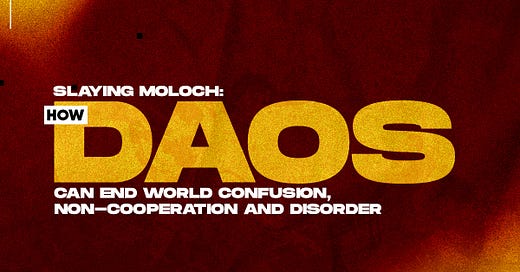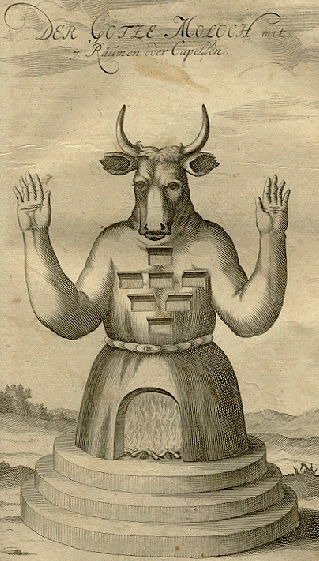#1 - Slaying Moloch: How DAOs can end world confusion, non-cooperation and disorder.
If everyone hates the current system, who perpetuates it? And how can DAOs enforce cooperation and solve world problems?
Look out for our trivia questions at the end of our articles. You might win some cool stuff. 💛
When you were 10, you believed you would grow to change the world. You were good at math, science, and government. You wanted to become a doctor to help sick people get better. Or a lawyer who'd grind their way through law school in order to free wrongly accused criminals in the dreaded Kiri-kiri maximum prison and win a Nobel peace prize in the process. The dreams were big, and with a little bit of work, you told yourself, they could become reality.
With teenagehood came a bit of self-awareness. At 19, reality set in. You realized you couldn’t make all sick people better. They didn’t have insurance or enough money to pay for their treatments, the hospitals were understaffed, there was no electricity to perform surgeries, and your salary would only last a week. You couldn’t end world hunger too; public funds were siphoned into private Swiss bank accounts and used for flying in private jets, palliatives were seized and put in warehouses and you certainly couldn’t end any wars from your couch in Surulere.
At 19 years old, you realized how powerless you were in effecting any real change in the world. You give up and choose another career – as a real estate broker selling houses, earning big bucks, and taking round trips in your own personal private jet. Congrats - You’ve become part of the greedy, nonchalant, distrustful, imbalanced system.
Guess what?
Moloch wins.
The Moloch folklore
In a detailed 1956 poem Howl, Allen Ginsberg introduces the world to a mythical being, Moloch. A god who is described as many things, but most importantly, as the god of chaos and human coordination failure. Failure triumphs over humanity because of human selfishness. People always put themselves first.
Human coordination failure, that is we humans’ inability to come together and solve the many problems that exist, appears in many ways. One popular example is the prisoner’s dilemma in game theory where two criminals end up betraying each other because they hope to get a better deal from the law. We see this happen often in films and in real life.
Slaying Moloch
So how do we go about changing this much-hated system to something that works for everyone?
In this story a man complains to a goddess, Eris about the evils of human society. He tells the goddess about people hurting one another and how the planet is filled with injustices, even within families and societies that ought to protect one another.
When she asks why that’s a problem, since everyone wants to commit these injustices, the man says, “Nobody wants it. Everybody hates it.”
“Oh well, then stop,” she concludes.
It should be that easy, right? If the people and societies hate the evil things they commit, why don’t they just end it? Don’t they have the power to do that?
From a god’s-eye-view, you can say if everyone agrees to stop doing this at once, the problem will be fixed. But no one is willing to take that chance without great risk to themselves.
Ameen Soleimani and Kevin Owocki explain in this podcast that the story of humanity is a never-ending iterative process of discovering new tools and mechanisms to coordinate against Moloch. As Ameen says, we slay Moloch whenever we sacrifice our own self-interest.
Case in point, a computer game proved this in 2017.
The Evolution of Trust is an HTML5 game designed by Nicky Case to allow players to explore life-like scenarios of how cooperation between strangers and even friends evolves.
The game shows us that we need three things for the evolution of trust:
Repeat interactions: Trust keeps a relationship going, but you need to have knowledge of future repeat interactions before trust can evolve.
Possible win-wins: You must be playing a non-zero-sum game, a game where both players can be better off. Win-win.
Low miscommunication: If the level of miscommunication is too high, trust breaks down. But with a little bit of miscommunication, it pays to be more forgiving.
This is what Decentralized Autonomous Organizations (DAOs) are here to do. Defeat Moloch through community and governance institutionalized by the blockchain.
If Moloch represents chaos and the unknown, DAO’s are the beam of light that shines through the darkness - a further iteration of man’s consistent attempt to organize a fair society that actually works.
This time, man turns to the blockchain. And Whew!
Nothing was ever the same.
Next week, we’d explain what DAO’s are, how they started, their growth, their uses, examples, and everything else in between. Till then, fight disorder. 💛
Thank you for reading this article and joining the fight against Moloch and his hordes of evil!
If you didn’t understand anything, you can reply to this mail and someone from faces would put you through shortly!
As usual, we’d be having our spaces discussing the article topic by 7 PM GMT. Please set a reminder here.
Trivia⚡⚡⚡⚡
Test your knowledge
Who is Moloch?
Tweet your response at us using the hashtag #TriviawithFOW3. We’ll send the person with the first correct answer a POAP (proof of attendance protocol, more on this later) and guide them in opening their first web3 wallet!




